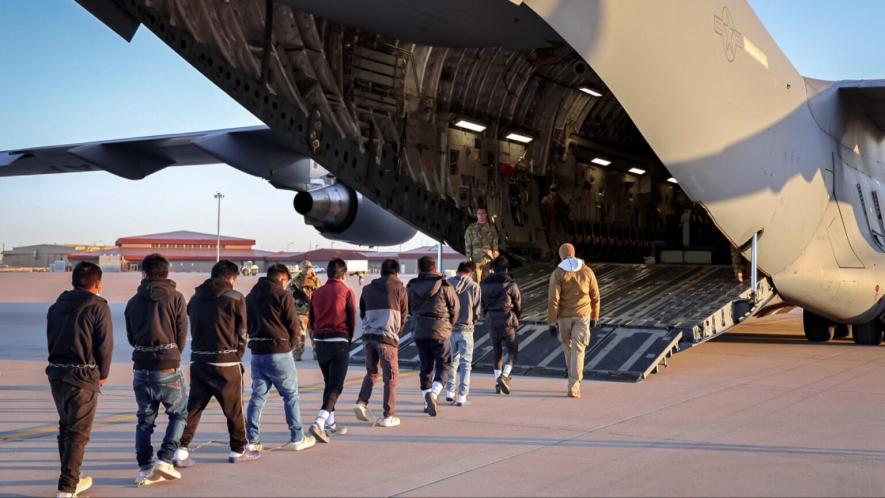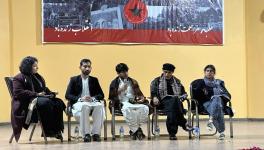How US Uses, Exploits and Discards Migrant Labour!

Deportation flight. Photo: Press Secretary Karoline Leavitt / White House
The US economy has been built on decades of sweat and toil of immigrant laboru, particularly in low-wage industries, such as agriculture, construction, and the services sector. These workers sustain industries that rely on cheap, easily replaceable labour with minimal legal protections. Despite their contributions, immigrants are demonised when politically convenient. Once their labour is no longer needed, they are labelled as “illegal” and subjected to harsh deportation measures.
This cycle of labour exploitation and deportation is not an accident, it is a deliberate system designed to suppress wages and prevent labour rights from strengthening. By keeping immigrant labour precarious, either through restrictive visa policies, lack of legal protections, or the constant threat of deportation, wages are kept low, and workers unable to demand better conditions.
Employers benefit from this insecurity, extracting maximum productivity while avoiding obligations, such as fair wages, healthcare, or job security. The state enforces this system by criminalising migrants when they attempt to establish stability, ensuring they remain trapped in a cycle of dependence and vulnerability.
The US deportation system is far from being a neutral enforcement mechanism, it is an entrenched economic and political strategy that serves the interests of the ruling elite while devastating working-class migrants. The label of “illegal immigrant” is a carefully constructed political tool, designed not only to stoke nationalist anxieties but also to distract from structural economic failures and opportunistic governance. Behind the rhetoric of border security lies a ruthless machinery of exploitation, profit-making, and systemic dehumanisation.
Deportations as Political Distraction
When the US experiences economic downturns or political crises, immigrants become easy scapegoats. Deportations increase, and the government frames the issue as one of national security rather than economic dependency. This allows policymakers to deflect attention from failing economic policies, corporate tax breaks, and widening income inequality.
The current US administration has proposed invoking the 1798 Alien Enemies Act to justify mass deportations without due process. The idea of “border security” is thus weaponised not to protect national interests but to reinforce racial and economic hierarchies. The true beneficiaries of these policies are not the working-class American citizens they claim to protect, but the corporate elite who profit from the precarious conditions of undocumented labour.
Mass deportations have become a multi-billion-dollar industry. Private detention centres, such as those run by CoreCivic and GEO Group, receive lucrative government contracts to house migrants before deportation. The longer a person is detained, the more profit these companies make. These facilities are notorious for inhumane conditions, overcrowding, lack of medical care, and reports of abuse are rampant.
The expansion of the deportation-industrial complex ensures that detention is prolonged unnecessarily, turning migrant suffering into a business model. The involvement of private corporations in immigration enforcement means that deportation policies are increasingly dictated by profit motives rather than human rights or legal due process.
Violations of International Human Rights Law
The recent use of military aircraft to deport migrants, such as the C-17 military plane carrying Ecuadorians, signals a dangerous shift toward the full militarisation of immigration enforcement. Deportations are no longer an administrative procedure but are now part of a security-state apparatus.
By treating migrants as enemy combatants rather than civilians, this policy erodes the distinction between civil governance and military operations. The use of military aircraft to deport vulnerable people sends a clear message to immigrant communities: their presence is not just unwanted, it is treated as a national threat.
Theatrical deportations, including mass removals carried out in highly publicised raids, serve as propaganda to appeal to Far-Right nationalist voters. Ramping up deportations through cruel and theatrical means helps convert civil deportations into a political spectacle, reinforcing the perception that immigrants are responsible for social and economic woes.
The deportation process has become increasingly violent and degrading, with migrants being handcuffed, shackled, and treated like criminals. Reports detail the harrowing experiences of deportees, 104 Indian migrants deported on a US military flight to Amritsar were chained for the entire 40-hour journey.
These actions violate multiple international agreements:
• The Universal Declaration of Human Rights (UDHR, 1948) prohibits cruel, inhuman, or degrading treatment (Article 5).
• The International Covenant on Civil and Political Rights (ICCPR) prohibits arbitrary detention and inhumane treatment.
• The UN Convention against Torture (CAT) condemns acts of state-sanctioned cruelty.
Despite being a signatory to these agreements, the US blatantly disregards its commitments in its deportation policies. The fact that migrants are shackled, denied medical care, and subjected to prolonged detention before deportation makes it clear that these are not administrative procedures but calculated acts of oppression.
India’s Silence
One of the most disturbing aspects of the current deportation crisis is the silence of the Indian government despite blatant human rights violations against its own people. Despite Indian migrants being subjected to inhumane treatment, chained, and shackled during deportations, the Indian state has failed to issue a strong response.
While Mexico, Ecuador, and other nations have protested the treatment of their deported citizens, India remains passive. The deportation of 104 Indian migrants under brutal conditions was met with no official protest, no diplomatic pressure, and no attempt to hold the US accountable.
India’s silence on the brutal deportation practices of the US stems from a combination of geopolitical, economic, and political factors. The Narendra Modi government has strategically aligned itself with US interests, particularly in countering China, and is unwilling to risk this alliance by challenging Washington on human rights violations against Indian migrants. This diplomatic calculus prioritises strategic partnerships over the welfare of its own citizens abroad.
Additionally, the Indian government exhibits selective outrage, raising concerns over issues affecting students and high-skilled professionals in Western countries while ignoring the plight of working-class migrants, whose contributions are often undervalued. This reflects a deeper diaspora hypocrisy, where India celebrates its global diaspora when it benefits economic and political interests such as remittances and soft power but abandons vulnerable migrants when they face mistreatment.
By refusing to challenge the US on its inhumane deportation policies, India tacitly endorses the dehumanisation of its own people. This silence sends a clear message: Indian migrants are valuable when they send money back home, but disposable when they need protection.
A Human Rights Crisis
The weaponisation of deportation is not just a US issue, it is part of a global system of inequality. The same neoliberal policies that force people to migrate in search of work are the ones that criminalise them once they arrive. If deportations continue under such conditions, they will set a dangerous precedent. Other nations may adopt similar policies, making the mass expulsion of marginalised communities a norm rather than an exception.
The current US deportation policy is a brutal manifestation of racial capitalism, where migrants are exploited when needed and discarded when convenient. These policies are not about enforcing the law; these are about control, profit, and political power. If these deportations go unchallenged, they will only become more extreme. The fight against them is not just about immigration, it is about defending the very principles of human dignity and justice in an increasingly hostile world.
The international community must take a stand. Governments of affected nations must refuse to remain passive. Human rights organisations must challenge these violations on the global stage. Most importantly, movements for migrant justice must continue to resist.
Shirin Akhter is Associate Professor, Department of Economics, Zakir Husain Delhi College, University of Delhi. The views are personal.
Get the latest reports & analysis with people's perspective on Protests, movements & deep analytical videos, discussions of the current affairs in your Telegram app. Subscribe to NewsClick's Telegram channel & get Real-Time updates on stories, as they get published on our website.
























